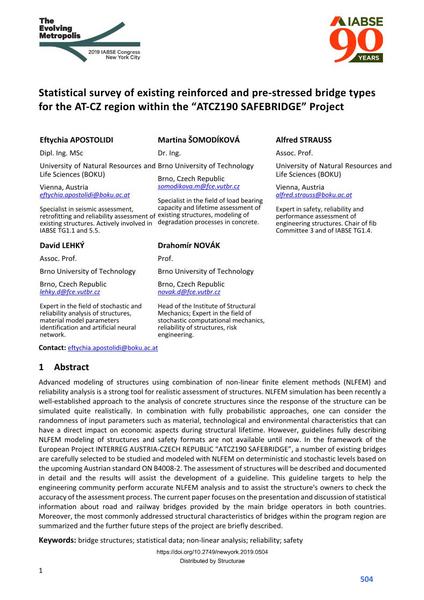Statistical survey of existing reinforced and pre-stressed bridge types for the AT-CZ region within the "ATCZ190 SAFEBRIDGE" Project

|
|
|||||||||||
Détails bibliographiques
| Auteur(s): |
Eftychia Apostolidi
(University of Natural Resources and
Life Sciences (BOKU))
Martina Šomodíková Alfred Strauss |
||||
|---|---|---|---|---|---|
| Médium: | papier de conférence | ||||
| Langue(s): | anglais | ||||
| Conférence: | IABSE Congress: The Evolving Metropolis, New York, NY, USA, 4-6 September 2019 | ||||
| Publié dans: | The Evolving Metropolis | ||||
|
|||||
| Page(s): | 504-511 | ||||
| Nombre total de pages (du PDF): | 8 | ||||
| DOI: | 10.2749/newyork.2019.0504 | ||||
| Abstrait: |
Advanced modeling of structures using combination of non‐linear finite element methods (NLFEM) and reliability analysis is a strong tool for realistic assessment of structures. NLFEM simulation has been recently a well‐established approach to the analysis of concrete structures since the response of the structure can be simulated quite realistically. In combination with fully probabilistic approaches, one can consider the randomness of input parameters such as material, technological and environmental characteristics that can have a direct impact on economic aspects during structural lifetime. However, guidelines fully describing NLFEM modeling of structures and safety formats are not available until now. In the framework of the European Project INTERREG AUSTRIA‐CZECH REPUBLIC "ATCZ190 SAFEBRIDGE", a number of existing bridges are carefully selected to be studied and modeled with NLFEM on deterministic and stochastic levels based on the upcoming Austrian standard ON B4008‐2. The assessment of structures will be described and documented in detail and the results will assist the development of a guideline. This guideline targets to help the engineering community perform accurate NLFEM analysis and to assist the structure's owners to check the accuracy of the assessment process. The current paper focuses on the presentation and discussion of statistical information about road and railway bridges provided by the main bridge operators in both countries. Moreover, the most commonly addressed structural characteristics of bridges within the program region are summarized and the further future steps of the project are briefly described. |
||||
